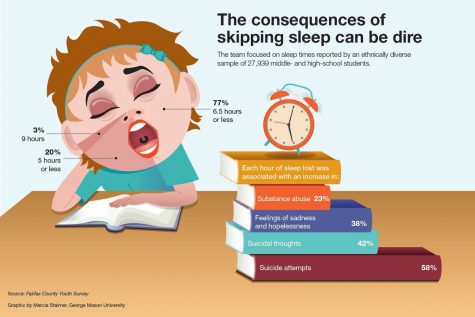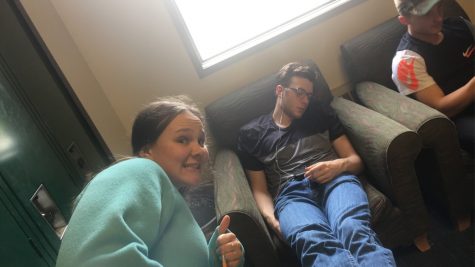The Sleepless Seahawks
January 9, 2020
As a high school student, I can attest to the lack of sleep teenagers receive. Every morning, conversations in the commons consist of teens attempting to one up one another by boasting about how little sleep they got the night before. Who stayed up until one, how about two or three?
With coffee clutched in their hands, the damage to students seems to be only a few yawns and some unfortunate dark circles. However, the consequences of sleep deprivation go much deeper and can even be dangerous.
A lack of sleep can result in a bad appearance, lower grades, a worsened social life, and poor performance in sports. Additionally, for teens that drive consistently, the chance of falling asleep at the wheel provides an opportunity for injury and even death.
Most professionals agree that teenagers need approximately 8 to 10 hours of sleep. However, the majority of students report getting significantly less. Because teens have developing bodies and minds, it is natural for certain aspects of their life to change. This includes their sleep schedule, which will vary as their body determines its own patterns. For many, this means they won’t feel ready to sleep until around 11:00 PM.
At Seward High School, school starts at 7:45. For many students, waking up at 6:30 provides enough time to get ready and get to class. However, with a sleep schedule which prevents them from going to bed until 11, a student can only get 7.5 hours of sleep, when they should receive a minimum of 8. Additionally, for Moose Pass and out of town students, they need to wake up even earlier to make it to school on time. For Moose Pass resident and junior Cody Bryden, he has to wake up at 5:45 at the latest if he wants to catch the bus. With commute time, out of town students get even less time to take care of their responsibilities. “Because of where I live,” Bryden says, “I don’t have as much time to work on schoolwork which puts me at a disadvantage. It means I have to stay up late and get less sleep.”

According to the National Sleep Foundation, a consistent lack of sleep can cause long-term issues with memory, comprehension, concentration, anger, and addiction. Sleepless students are also more prone to stress, acne, unhealthy diets, depression/mental illness, and substance abuse.
Many solutions simply suggest teens go to bed. However, with constantly changing sleep patterns and the inconsistency of schedules regarding sports, homework, family, and jobs, just going to bed isn’t exactly a viable option. The stress of responsibilities can often be more intense than exhaustion, causing students to stay up as long as possible to get their work done. As long as their conscious, students want to be doing something instead of lying in bed waiting to fall asleep. Even when they get in bed at a reasonable hour, the demand school and other responsibilities place on online work means they spend a large majority of their evening staring at a screen. Screens are known to suppress the production of melatonin, a sleep hormone in the brain. While some suggest kids just ‘get off their phones to get better sleep, it is more often a computer screen used for homework that is keeping them up. Senior Connor Spanos admits that “even though I put my phone away, I toss and turn at night. My mind just runs. I’m usually thinking about the next school day.”

With teens helplessly exhausted, teachers, parents, and students alike have looked to the schools and recommended switching to a later start time. The argument against this is that teens would take advantage of the extra time and stay up even later. However, the schools that have switched to a later start time found that teens generally fell asleep around the same time as before but woke up with an additional hour of sleep. Overall, this means these students are getting five more hours of sleep a week. Students were also found to be more energetic and attentive with a later start time. Attendance and enrollment improved as well.
Seward High is certainly a great school filled with incredible young minds. However, these young minds are suffering as they endure late nights and little rest. School is a place to learn and grow with our brains, but our brains cannot develop under the stress of sleepless nights. The answer may not be to simply go to sleep or start school later, but the problem is clear. Teenagers aren’t getting enough sleep and they are experiencing drastic side effects as a result.





Sophia • Jan 14, 2020 at 9:16 am
Really interesting article! I’ve definitely noticed that on days I don’t have a first period and get to sleep an extra hour I feel much more productive than days I have one.